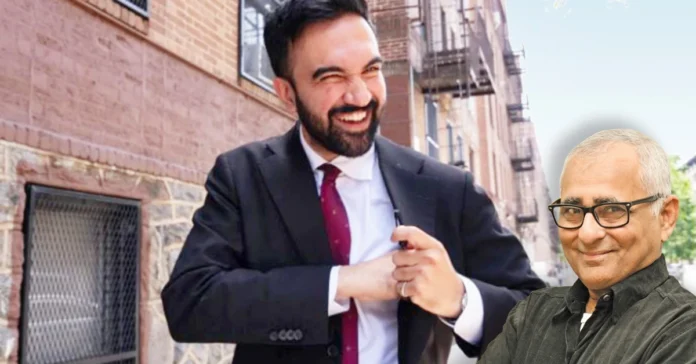By Inderjit Badhwar
The surprise triumph of Zohran Mamdani in New York City’s Democratic mayoral primary is, on its face, a quintessentially American story: A young, second-generation immigrant defies the odds, unseats a seasoned political giant, and charts a path to power powered not by money, but by authenticity and grassroots mobilization. But to see Mamdani’s ascent as purely an American political curiosity would be to underestimate the scale of the moment.
This is not just New York’s story. Nor is it only America’s. The Mamdani phenomenon is a global reckoning, a signal flare rising over the crowded rooftops of New York and lighting up conversations far beyond city limits—from the halls of Westminster to the streets of Mumbai and Nairobi, and yes, into the hushed drawing rooms of Lutyens’ Delhi.
At its core, Mamdani’s victory tells us something simple, but searing: Political parties that grow complacent—who take voters for granted, or assume that charisma can paper over corruption—do so at their peril. It is a truth increasingly visible in the rise of insurgent political figures across the globe. Mamdani is not alone in riding the twin waves of inter-generational anger and economic anxiety, but he is perhaps the most emblematic of how deep those currents now run.
Because here is a politician who checks almost none of the boxes traditionally associated with power in America—Muslim, African-born, brown-skinned, socialist, supportive of Palestinian rights—and yet finds himself not only accepted, but embraced by a city long presumed too jaded for idealism.
It’s a profound rebuke to the notion that identity disqualifies, or that populism must be regressive. Mamdani’s campaign wasn’t built on fear or tribalism, but on a radical faith in fairness—and a deep belief that people, when listened to and respected, will respond with something stronger than cynicism: Hope. And that’s precisely what makes this such a consequential story for India.
As a nation where political dynasties and communal polarization often dominate electoral discourse, Mamdani’s rise offers a sharp counterpoint. He is the son of Mira Nair, the internationally renowned Indian filmmaker whose work has consistently interrogated identity, exile, and justice. His father, Mahmood Mamdani, is one of Africa’s most respected political thinkers, whose academic work remains deeply relevant to any society grappling with colonial legacies and democratic fragility.
That such a figure—shaped by South Asian, African, and Western influences—should now be poised to lead America’s largest city is no small matter. It’s a milestone not just for immigrants, or progressives, or socialists, but for the entire idea of global citizenship.
Mamdani stands as part of a growing cohort of Indian-heritage figures reshaping American political life. Kamala Harris, vice president of the United States, often invokes her Tamil roots. Pramila Jayapal leads the Congressional Progressive Caucus and regularly speaks out on racial justice, healthcare, and immigration. Even Kash Patel—though positioned at the opposite ideological end—occupies a space of real influence in conservative American circles.
Together, they represent something more than representation. They embody the fracturing of the old diaspora narrative—that success in the West for Indian-origin individuals must come through assimilation, silent loyalty, or elite respectability. Instead, we now see diaspora leaders who are as likely to challenge the status quo as to reinforce it. This should force introspection in India.
For too long, Indian politics—across party lines—has celebrated the diaspora only when it plays ceremonial roles: attending Pravasi Bharatiya Divas, investing in tech parks, or waving flags at Madison Square Garden. But what happens when children of that diaspora grow into global politicians with views on Kashmir, caste, climate, capitalism—and are willing to express them publicly?
What happens when one of them becomes Mayor of New York, and doesn’t just bring Bollywood to Times Square, but brings rent control, bus fare abolition, and critiques of economic inequality to the steps of City Hall? Are we prepared for a world where Indian heritage means not just celebration, but accountability?
Because Mamdani’s victory forces that conversation—not only for Americans, but for all democracies wrestling with who gets to belong, who gets to lead, and what vision of the future we’re truly offering young people.
His campaign didn’t rely on nostalgia or rhetoric. It relied on proximity: walking borough after borough, listening to real fears about housing, wages, and dignity. It is the same distance between politicians and people that many parties in India have dangerously allowed to widen, believing slogans and caste calculus can replace sincere public engagement. They cannot.
Mamdani’s win should be seen as both a warning and an invitation. It warns establishment figures everywhere—whether in Albany or Ahmedabad—that the next generation is watching, organizing, and voting. It also invites us to imagine a politics that transcends fear, tribalism, and tokenism—and instead prioritizes policy, compassion, and participation.
It may have started in New York, but it won’t stop there.


